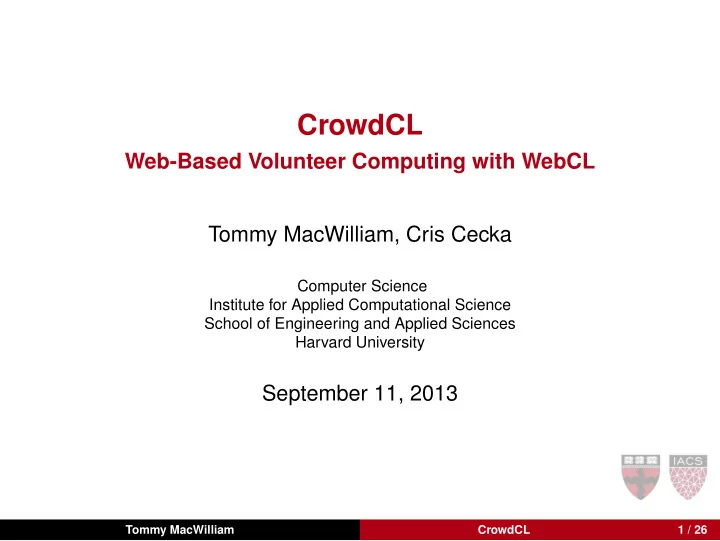

CrowdCL Web-Based Volunteer Computing with WebCL Tommy MacWilliam, Cris Cecka Computer Science Institute for Applied Computational Science School of Engineering and Applied Sciences Harvard University September 11, 2013 Tommy MacWilliam CrowdCL 1 / 26
Volunteer Computing “Donation" of CPU cycles to scientific problems Folding@home 300,000 contributors... right now. 5 PetaFLOPS sustained SETI@home 3 million participants PrimeGrid, GPUGRID, NFS@Home, NSA@Home (j/k) Tommy MacWilliam CrowdCL 2 / 26
High Throughput Science Tommy MacWilliam CrowdCL 3 / 26
High Throughput Science Tommy MacWilliam CrowdCL 4 / 26
High Throughput Science Tommy MacWilliam CrowdCL 5 / 26
High Throughput Science Tommy MacWilliam CrowdCL 6 / 26
Goals Bring volunteer computing to the web browser “Volunteer" Reduce downloading/installing friction. Web-browser as a high-performance distributed computing platform. Develop robust library for GPU computing in Javascript. Enable GPU development and metaprogramming on the web. “Windows and Linux present a near-infinite combination of hardware, software, and drivers that would not be encountered in a local setting. This means that a significant amount of time is spent dealing with incompatibilities when the clients are developed, and every time a new version of the operating system is shipped such as Windows 7, or the latest version of a Linux distribution." – Beberg et al. Folding@home: Lessons From Eight Years of Volunteer Distributed Computing Tommy MacWilliam CrowdCL 7 / 26
WebCL Experimental cross-platform JS binding for OpenCL Available for Firefox, WebKit, and Node.js API is verbose, procedural, and difficult to use Tommy MacWilliam CrowdCL 8 / 26
Contributions KernelContext, KernelUtils PyCUDA inspired abstraction layer for WebCL CrowdCL Framework for developing and deploying high performance, web-based volunteer computing projects. Application to existing crowd-generated data project. Comparison with existing cross-platform solutions Tommy MacWilliam CrowdCL 9 / 26
KernelContext Abstraction layer for WebCL inspired by PyCUDA Minimizes WebCL/OpenCL boilerplate OpenCL kernels are first-class citizens Lazy evaluation utilizes the OpenCL command queue. Tommy MacWilliam CrowdCL 10 / 26
KernelContext 1 var ctx = new KernelContext ; 2 var source_str = "__kernel void FN_NAME (...) {...}" 3 var kernel = ctx.compile(source_str , ’FN_NAME ’); 4 5 var data = new Uint32Array (10); 6 var d_data = ctx.toGPU(data); 7 kernel ({ local: 32, global: 32}, d_data); 8 ctx.fromGPU(d_data , data); Tommy MacWilliam CrowdCL 11 / 26
KernelUtils Dynamically generate kernels following common patterns mapKernel, reduceKernel Generate a re-usable map or reduce kernel “Templated" on map/reduce operation Hides complexity – job size, multiple launches, etc. map, reduce Generate and launch a single-use map or reduce kernel Tommy MacWilliam CrowdCL 12 / 26
KernelUtils 1 var ctx = new KernelContext ; 2 var util = new KernelUtils(ctx); 3 4 var a1 = new Uint32Array (10); 5 var result = util.map(’x’, ’x[i] + 1’, a1); 6 7 var a2 = new Uint32Array (100000); 8 var result = util.map(’x’, ’x[i] * 0.43 ’, a2); Tommy MacWilliam CrowdCL 13 / 26
KernelUtils 1 var ctx = new KernelContext ; 2 var util = new KernelUtils(ctx); 3 4 var a1 = new Uint32Array (10); 5 var sum1 = util.reduce(’a + b’, a1); 6 var max1 = util.reduce(’(a > b) ? a : b’, a1); 7 8 var a2 = new Uint32Array (100000); 9 var prd2 = util.reduce(’a * b’, a2); 10 var min2 = util.reduce(’(a < b) ? a : b’, a2); Tommy MacWilliam CrowdCL 14 / 26
KernelUtils 1 var sum_kernel = util. reduceKernel (Uint32Array , ’a + b’); 2 var max_kernel = util. reduceKernel (Uint32Array , ’(a > b) ? a : b’); 3 4 var a1 = new Float32Array (100000); 5 var d_a1 = ctx.toGPU(a1); 6 7 var sum2 = sum_kernel(d_a1); 8 var max2 = max_kernel(d_a1); Tommy MacWilliam CrowdCL 15 / 26
CrowdCL Built on KernelContext to provide a re-usable framework for volunteer computing applications CrowdCLient Client library – generate results via WebCL CrowdServer Server library – collect results, aggregate data Tommy MacWilliam CrowdCL 16 / 26
CrowdCL Architecture Tommy MacWilliam CrowdCL 17 / 26
CrowdCLient Execute code in the background of a web page Send batched results to CrowdServer Acts like a Thread class: Define a run method that generates results for a problem API to pause , resume , and sleep execution. Tommy MacWilliam CrowdCL 18 / 26
CrowdServer RESTful Node.js application to aggregate CrowdCLient results Supports both MongoDB and MySQL to store data Tommy MacWilliam CrowdCL 19 / 26
Thomson Problem Thomson problem: nonlinear optimization problem, useful in many problems in biology, math, physics, and computer science Lowest energy configurations of N repelling charges on a sphere Force (gradient) and energy require O ( N 2 ) computation. Number of local minima grows exponentially with N Tommy MacWilliam CrowdCL 20 / 26
Thomson Problem Let ω N = x 1 , . . . , x N with � x i � = 1 and 1 � E s ( ω N ) = � x − y � s x , y ∈ ω N x � = y Gradient descent: Compute the gradient (force on each point x ∈ ω N ) x − y � G ( ω N )[ x ] = | x − y | 3 y ∈ ω N y � = x Compute a (heuristic) step-length ds := f ( ω N , G ( ω N )) Update all points in ω N and renormalize x := x + ds · G ( ω N )[ x ] x x := � x � Tommy MacWilliam CrowdCL 21 / 26
NVIDIA 320M Tommy MacWilliam CrowdCL 22 / 26
NVIDIA Tesla K20 Tommy MacWilliam CrowdCL 23 / 26
Kernel Performance (NVIDIA 320M) Tommy MacWilliam CrowdCL 24 / 26
WebCL only available on Firefox 19 + plugin Nice, big security issues for general deployment Tommy MacWilliam CrowdCL 25 / 26
Thank you https://github.com/tmacwill/webcl-kernelcontext https://github.com/tmacwill/crowdcl Tommy MacWilliam CrowdCL 26 / 26
Recommend
More recommend